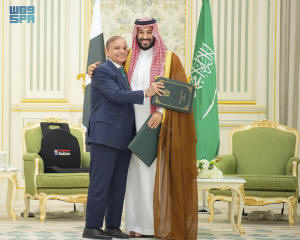Saudi Arabia signs a mutual defense pact with nuclear-armed Pakistan
after Israel's attack on Qatar
[September 19, 2025]
By MUNIR AHMED and JON GAMBRELL
ISLAMABAD (AP) — Saudi Arabia and nuclear-armed Pakistan have signed a
mutual defense pact that defines any attack on either nation as an
attack on both — a key accord in the wake of Israel's strike on Qatar
last week.
The kingdom has long had close economic, religious and security ties to
Pakistan, including reportedly providing funding for Islamabad's nuclear
weapons program as it developed. Analysts — and Pakistani diplomats in
at least one case — have suggested over the years that Saudi Arabia
could be included under Islamabad's nuclear umbrella, particularly as
tensions have risen over Iran's atomic program.
But the timing of the pact appeared to be a signal to Israel, long
suspected to be the Middle East's only nuclear-armed state, which has
conducted a sprawling military offensive since Hamas' Oct. 7, 2023,
attack on Israel stretching across Iran, Lebanon, the Palestinian
territories, Qatar, Syria and Yemen.
Israel did not respond to requests for comment. The pact marks the first
major defense decision by a Gulf Arab country since the Qatar attack.
The United States, long the security guarantor for the Gulf Arab states,
also did not respond to questions posed to the State Department.
A deal signed in Riyadh
Saudi Arabia’s powerful Crown Prince Mohammed bin Salman signed the pact
on Wednesday with Pakistan’s Prime Minister Shehbaz Sharif.
While not specifically discussing the bomb, the agreement states “any
aggression against either country shall be considered an aggression
against both,” according to statements issued by both Pakistan’s Foreign
Affairs Ministry and the state-run Saudi Press Agency.
“This agreement ... aims to develop aspects of defense cooperation
between the two countries and strengthen joint deterrence against any
aggression,” the statement said.

A senior Saudi official, speaking on condition of anonymity to The
Financial Times, seemed to suggest that Pakistan's nuclear protection
was a part of the deal, saying it "will utilize all defensive and
military means deemed necessary depending on the specific threat."
Zalmay Khalilzad, a former U.S. diplomat with long experience in
Afghanistan and Pakistan, expressed concern over the deal, saying it
comes in “dangerous times.”
“Pakistan has nuclear weapons and delivery systems that can hit targets
across the Middle East, including Israel. It also is developing systems
that can reach targets in the U.S.," Khalilzad wrote on X.
A long defense relationship
Pakistan and Saudi Arabia have a defense relationship stretching back
decades, in part due to Islamabad's willingness to defend the Islamic
holy sites of Mecca and Medina in the kingdom. Pakistani troops first
traveled to Saudi Arabia in the late 1960s over concerns about Egypt's
war in Yemen at the time.
Those ties increased after Iran's 1979 Islamic Revolution and the
kingdom's fears of a confrontation with Tehran.
Pakistan developed its nuclear weapons program to counter India's atomic
bombs. The two neighbors have fought multiple wars against each other
and again came close to open warfare after an attack on tourists in
April in Indian-controlled Kashmir. India is believed to have an
estimated 172 nuclear warheads, while Pakistan has 170, according to the
U.S.-published Bulletin of Atomic Scientists.
On Thursday, India's Foreign Ministry acknowledged the Saudi-Pakistan
pact and said it “will study the implications of this development for
our national security as well as for regional and global stability.”
Saudi Arabia also maintains close ties with India.

[to top of second column]
|

This handout photograph released by the state-run Saudi Press Agency
shows Pakistani Prime Minister Shehbaz Sharif, left, embracing Saudi
Arabia's Crown Prince Mohammed bin Salman after signing a joint
defense pact in Riyadh, Saudi Arabia, Wednesday, Sept. 17, 2025.
(Saudi Press Agency via AP)

An interest in Pakistan's program
Retired Pakistani Brig. Gen. Feroz Hassan Khan, in his book on his
country's nuclear weapons program called “Eating Grass: The Making
of the Pakistani Bomb,” said Saudi Arabia provided “generous
financial support to Pakistan that enabled the nuclear program to
continue, especially when the country was under sanctions."
Pakistan faced U.S. sanctions for years over its pursuit of the bomb
— and saw new ones imposed over its ballistic missile work at the
end of the Biden administration.
In a 2007 U.S. diplomatic cable published by WikiLeaks, American
diplomats in Saudi Arabia noted that their Pakistani counterparts
had brought up the idea of the kingdom pursuing a weapons program
alongside Islamabad in order to be the “physical protector” of the
Mideast.
Both Pakistan and Saudi Arabia did not respond to questions from The
Associated Press on Thursday on whether the pact extended to
Islamabad's nuclear weapons arsenal. Pakistan “has historically
maintained a deliberately ambiguous nuclear doctrine,” according to
the Bulletin of Atomic Scientists.
Syed Muhammad Ali, an Islamabad-based security analyst, noted on
Thursday that Pakistan's National Command Authority — which oversees
the country's atomic weapons — had not made any statement on the
pact. However, he said he believed Pakistan capable of responding to
Israel even without the deterrent effect of atomic weapons.
“Pakistan is more than confident that its conventional capability is
adequate,” he said. “Pakistan's military ... is adequate enough to
improve the security of Saudi Arabia without having to resort to the
nuclear option.”
How Iran ties in
Saudi Arabia has sought U.S. assistance to advance a civilian
nuclear power program, in part with what had been a proposed
diplomatic recognition deal with Israel prior to the 2023 Hamas
attack that triggered the nearly two-year war in Gaza. That could
allow Saudi Arabia to enrich uranium in the kingdom — something that
worries nonproliferation experts as spinning centrifuges opens the
door to a possible weapons program.

That deal — and a Saudi recognition of Israel — seem further away
than ever as the kingdom has condemned Israel's actions in Gaza and
the crown prince has come out saying that Israel is committing a
“genocide” in the Gaza Strip.
However, Prince Mohammed has also said the kingdom would pursue a
nuclear weapon if Iran had one. Saudi Arabia already is believed to
have a domestic ballistic missile program, which can be a delivery
system for a nuclear weapon. Still, the kingdom is a member of the
Nuclear Nonproliferation Treaty and is not known to have move toward
acquiring the bomb through its own work. Saudi Arabia has had a
Chinese-mediated detente with Iran since 2023.
Iranian Foreign Minister Abbas Araghchi had a call Thursday with his
Saudi counterpart, Prince Faisal bin Farhan, to discuss the pact.
___
Gambrell reported from Dubai, United Arab Emirates. Associated Press
writer Vineeta Deepak in New Delhi contributed to this report.
All contents © copyright 2025 Associated Press. All rights reserved |